AIU TOPICS
AIU Voices
Student Voice: Amy Shi, The Australian National University
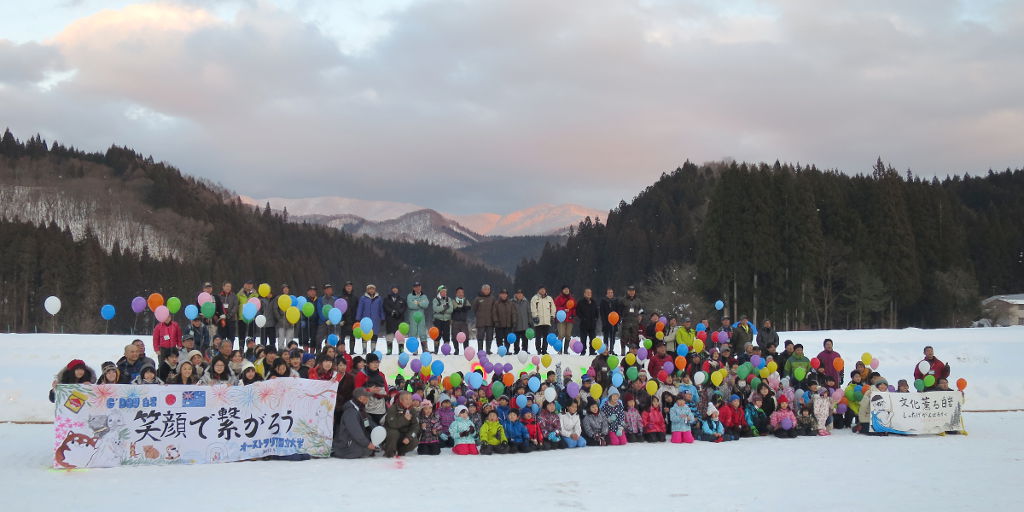
J-CIP:A Winter Program participants pose with the Shiraiwa Community at the Shiraiwa Illumination Festival they helped to run.
Amy Shi was one of eight participants in the Winter 2017 Japanese Language and Cultural Immersion Program: Advanced (J-CIP:A), a short-term program held concurrently with AIU’s regular winter classes.
J-CIP:A, for advanced learners of Japanese, is a content-based language learning course that exposes students to traditional Japanese and rural Akita culture while developing their communication abilities. It combines intensive language lessons with visits to cultural sites and three days of living with local families while helping to prepare and execute an annual rural revitalization festival.
For more information about the program, check out the video at the end of the post.
First Impressions of Akita
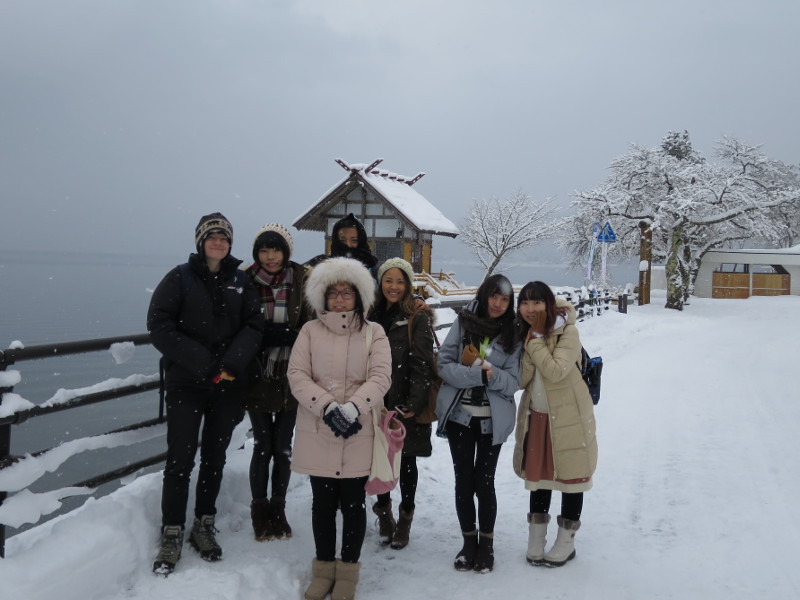
For students anticipating snow, Akita did not disappoint.
Admittedly, before coming to Akita, I knew very little about the area, other than the fact that it snowed a lot in winter and that we would be knee deep in snow. While this certainly was true (and one of my favorite things about Akita as it doesn’t snow back in Australia), through the course, I learned that there was so much more to Akita than meets the eye.
Extracurricular Activities: Exploring Akita
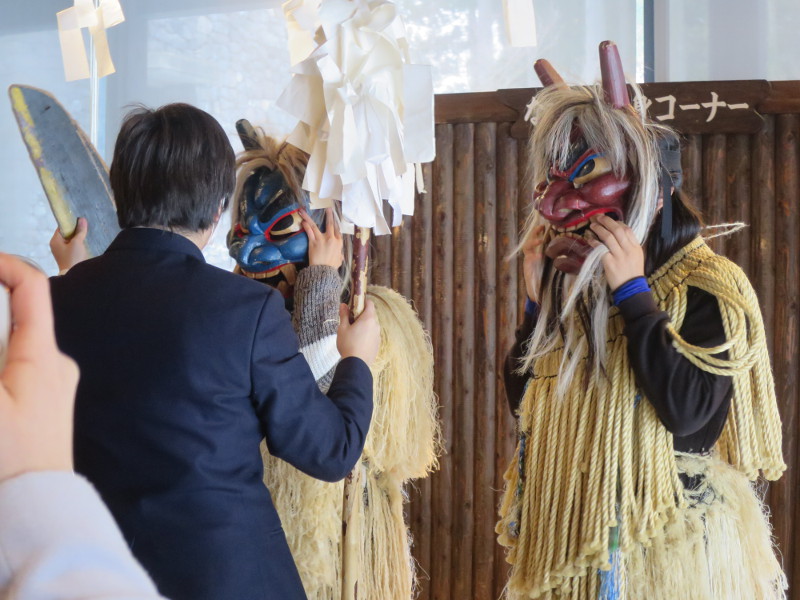
Students try on namahage costumes at Oga Peninsula. Namahage are gods that visit at the lunar New Year to ensure nobody is idle or ill-behaved.
The course contents were all directly related to the field trips we would go on and it captured my interest even more to see something in real life that we had learned on paper just a few days ago.
From the breathtaking views at Lake Tazawa, to the historically fascinating and beautiful samurai houses at Kakunodate, the scary (yet surprisingly friendly) Namahage in Oga-hanto, and teaching the enthusiastic and adorable students at Shiraiwa Primary School. . . there was a field trip for everyone.
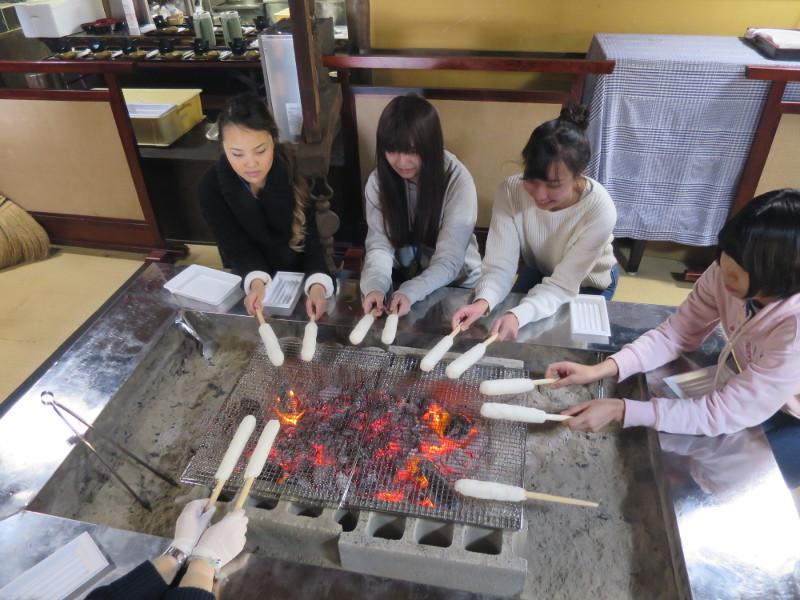
One of the field trips involved making kiritanpo, an Akita treat of mashed rice grilled on sticks over a fire.
Prior to this trip, I had never been to Japan before and had had little immersion with the culture outside of my Japanese classes, so I was expecting to experience some major culture shock upon arriving here. While that certainly was the case, and although I did find myself adjusting fairly quickly, the field trips allowed me to gain an even deeper and richer insight into the Japanese culture and the opportunity to truly experience all that Akita had to offer.
Alongside living in Akita for a short period, the extracurricular activities made me fall in love with Akita more than I thought possible.
Unique Experience: Rural Culture Immersion
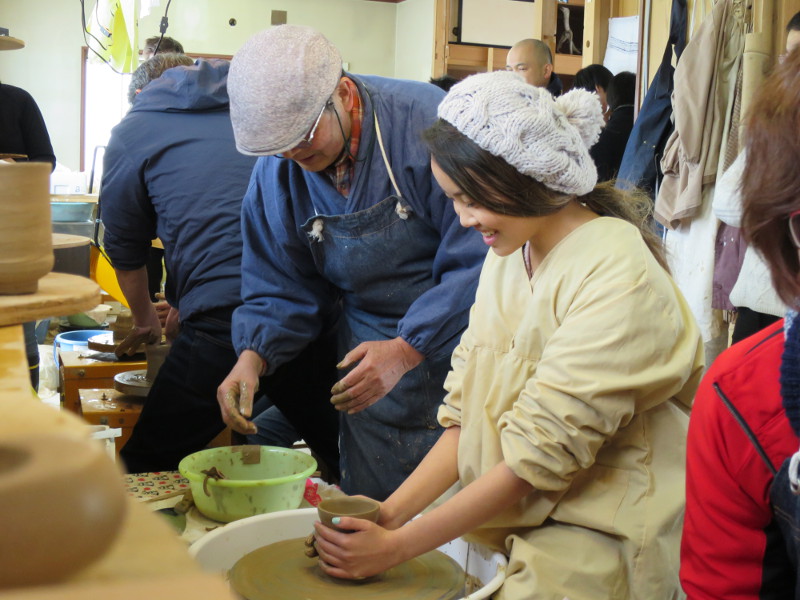
Amy gets advice from a local artisan during her homestay in Shiraiwa, which is famous for its unique pottery.
All the field trips were special and something I will carry with me forever, but the most memorable field trip was spending the weekend in Senboku-shi to stay with a host family and to assist with the Shiraiwa Fire Festival.
I was uplifted by the community spirit of the Shiraiwa village, touched by my host family’s generosity, and I also had the opportunity to learn and practice some Akita-ben with the locals – who at first glance appeared gruff, but would instantly laugh and clap before teaching me new words every time I spoke Akita-ben with them. As I said in my farewell speech to the Shiraiwa people, “秋田人になりました” (I became an Akita person).
The experience I had in Shiraiwa was truly unlike anything I could have experienced in Australia or in some of the larger cities in Japan. I felt as though I had submerged myself in an authentic traditional Japanese environment and the experience helped me grow, both as a person and with regards to my understanding about Japan.
Japanese Language Coursework and Results
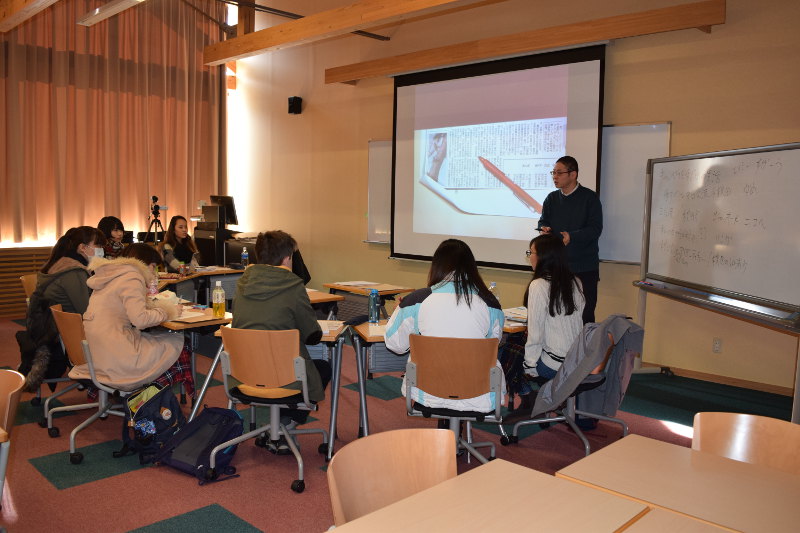
Small class settings and direct interaction with engaged instructors are hallmarks of the program.
While many may not believe it, studying in the classroom was just as fun as going on field trips as the teachers and students made the experience so special. All the teachers are so witty, helpful, kind, knowledgeable, and before long, we all felt like a little family.
Before coming to Japan, I had little confidence in speaking Japanese in the classroom, let alone in real life situations, but being in a supportive environment saw my Japanese speaking skills improve tenfold.
Not only was my knowledge of Akita broadened, but through my teachers and classmates, I learned that every mistake made is a lesson, and one day it dawned on me I was able to communicate with everyone more easily than when I had first arrived.
Campus Life at Akita International University
Prior to coming to Japan, I had also never lived on campus before. I had always had in my mind that living on campus meant having to think about uni work 24/7, but I quickly realized this wasn’t the case. In fact, living on campus was far greater an experience than I could have imagined it to be.
Living with a Japanese Roommate
Living with a Japanese roommate added another dimension to my experience in the program. Once my day was over and I was back in my room, I didn’t “switch” my Japanese off and sit alone in solitude. Instead, my roommate and I would have a chat about our day and I found that having to stay in the “Japanese mindset” all day really helped my Japanese improve.
It was also nice to always have companionship, and I was really touched by the little thoughtful things my roommate would do for me, be it lending me her hair dryer, or leaving snacks for me to eat when I woke up, after she saw that I was tired and had crashed in bed after just one class in the morning.
Making Friends from Around the World
Further, living on campus means making more friends than you would just going to class. I made all sorts of friends with different cultural backgrounds and different life experiences, and as a result, I learned so much not only about Japan, but also about other countries too through the multicultural community at AIU.
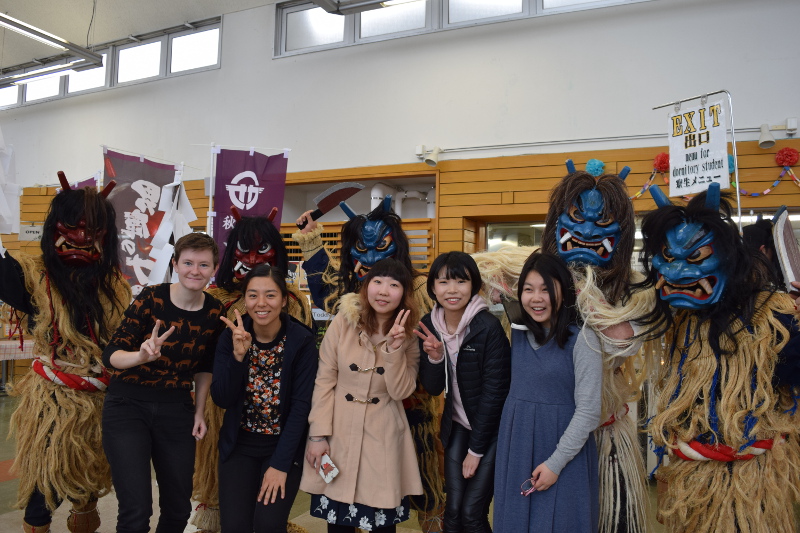
Namahage made an appearance at AIU’s cafeteria as well.
Every day I’d meet so many interesting people – Japanese people who would teach me modern Japanese slang, people who had interesting ideas shaped by other cultures (be it through exchange, being half-Japanese or being raised in Japan despite not being Japanese), and international students from countries I hadn’t even heard of on the other side of the world.
I truly treasure the friendships I’ve formed. Leaving Akita alone will be tough, but leaving all the wonderful people I’ve met will be the hardest part by a landslide.
